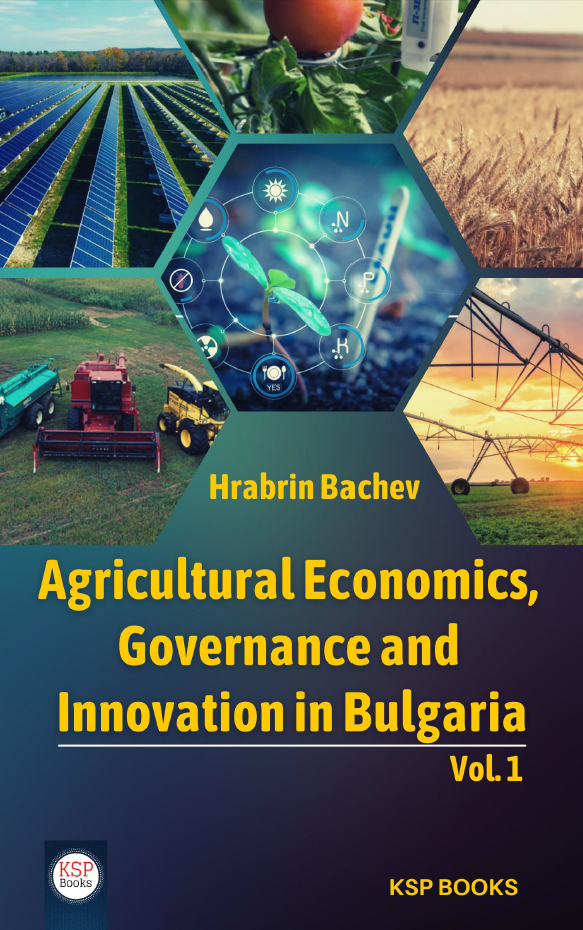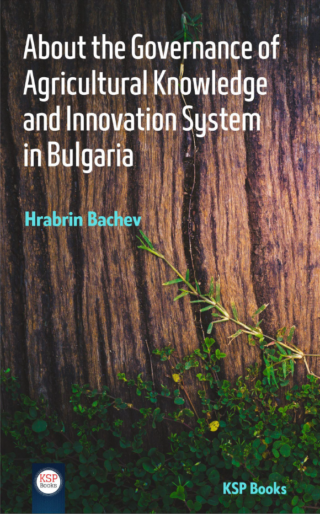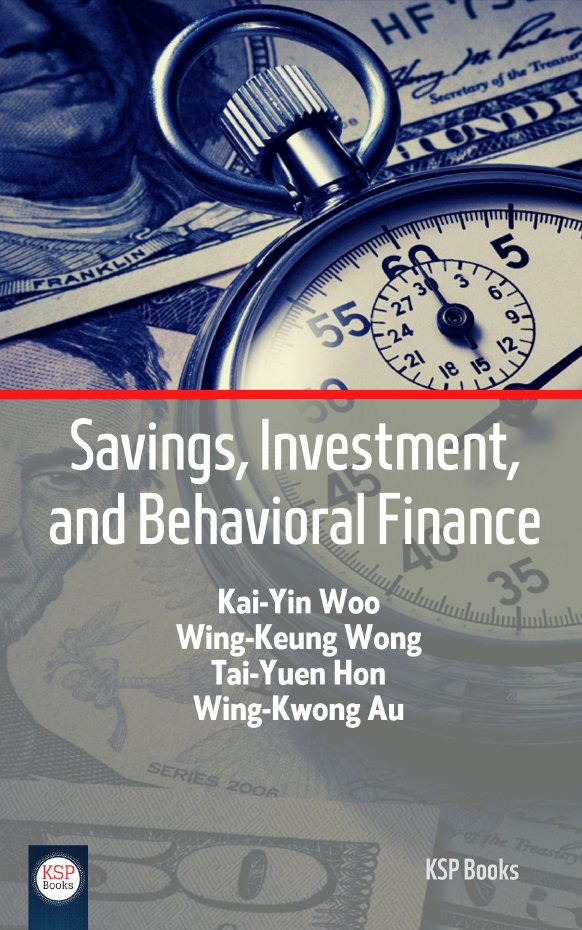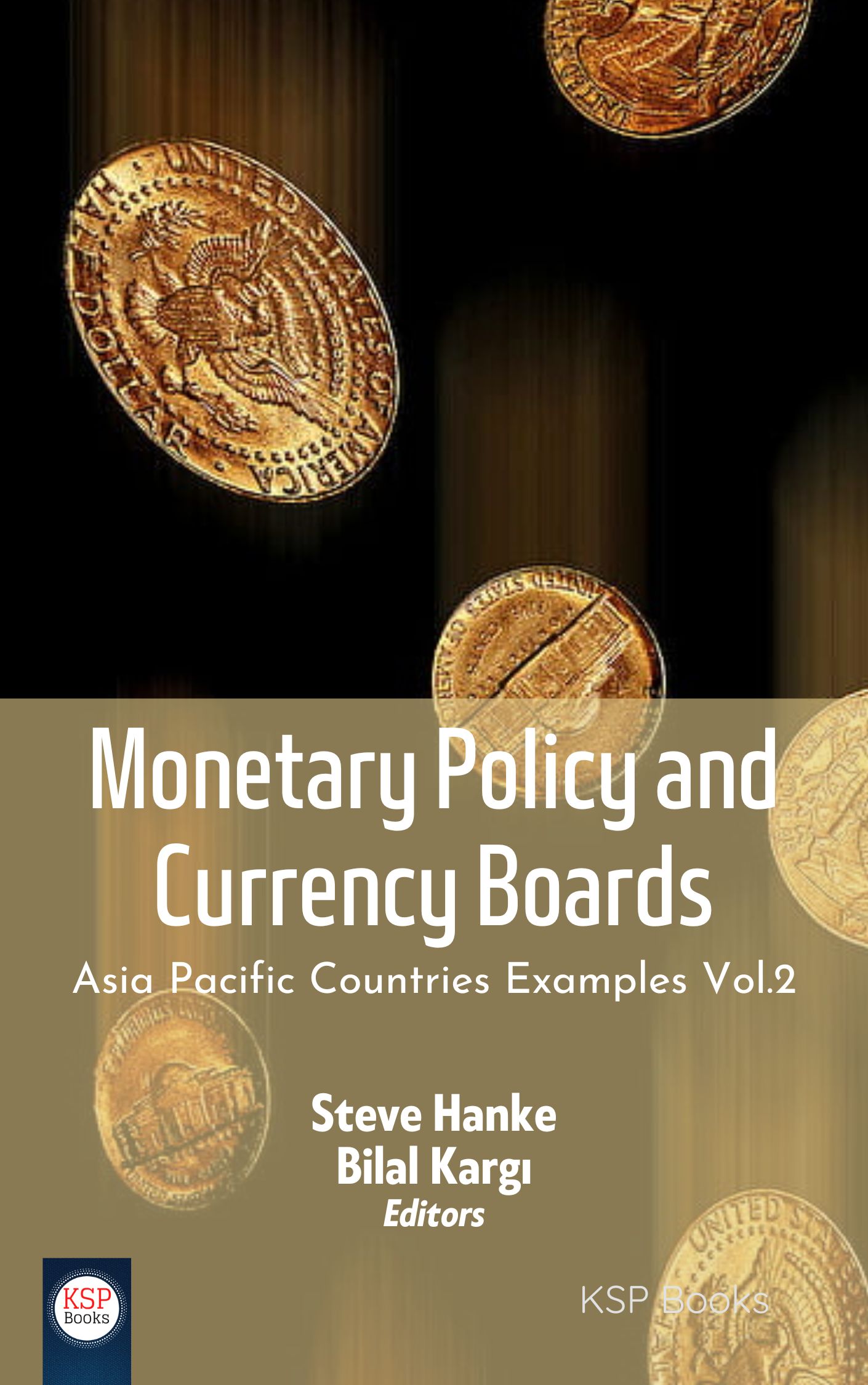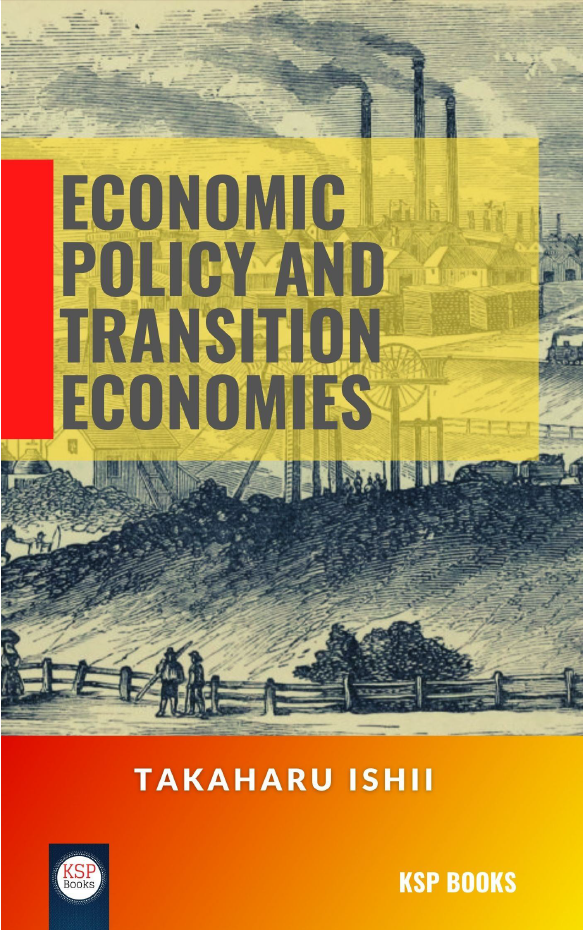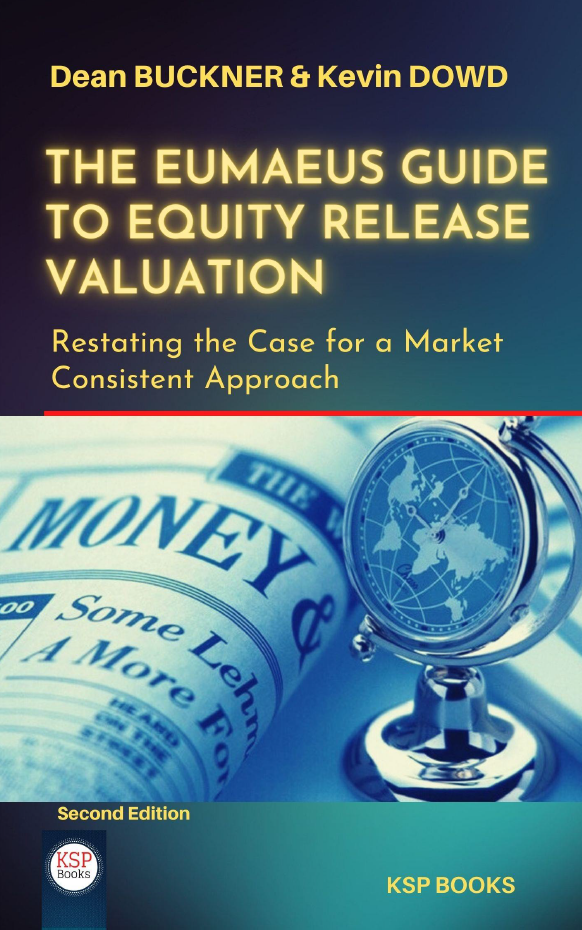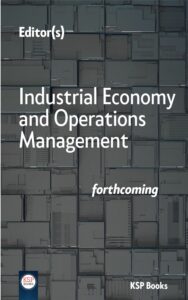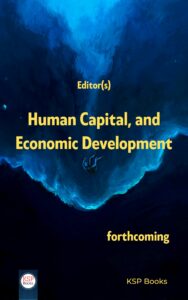By
Hrabrin Bachev
Institute of Agricultural Economics, Bulgaria
e-ISBN: 978-625-7501-24-8
Publishing Date: December 1, 2021
File Size: 5,594 MB
Length: xx + 262 pages (PDF)
Language: English
Dimensions: 13,5 x 21,5 cm
 This Book is completely open access. You can freely read, download and share with everyone.
This Book is completely open access. You can freely read, download and share with everyone. 
Despite huge progress in the theory and practice of this new area, still there is no consensus on how to assess the sustainability of agro-ecosystems due to diverse understandings, approaches, methods, employed data, etc. In Bulgaria there are practically no deep studies on sustainability level of diverse agro-eco-systems. This paper tries to fill the blank and assesses the sustainability level of agro-ecosystems of different type in Bulgaria. First a holistic hierarchical framework for assessing integral, economic, social and ecological sustainability of agro-ecosystems in Bulgaria is suggested including 17 principles, 35 criteria, and 46 indicators and reference values. After that, an assessment is made on overall and aspects sustainability of large (agro)ecosystems in North-Central, South-Eastern, South-Central and South-Western geographic regions, and particular main and specific types of agro-ecosystems of the country – mountainous, plain-mountainous, plain, riparian (Struma, Maritza, Yantra), southern Black Sea, mountainous area with natural constraints, non-mountainous area with natural constraints, protected areas and reserves, Western Thracian Plain, Middle Danube Plain, Dupnitsa and Sandansko-Petrich Valley, Sredna Gora Mountains and Western Rila Mountains. The assessment is based on first-hand information collected though in-depth interviews with the managers of “typical” farms in the respective ago-ecosystems. The study has found out that there is a considerable differentiation in the level of integral sustainability in agricultural ecosystems of different types. Furthermore, there are substantial variations in the levels of economic, social and ecological sustainability of agro-ecosystems of different type, and the critical indicators enhancing or deterring overall and particular sustainability of individual agro-ecosystems.
Despite the greattheoretical and practical significance, in Bulgaria there are no comprehensiveanalysis of the state and evolution of agrarian research and development (ARD) activities. The goal of this paper is to analyze the state and evolution of ARD in Bulgaria during the period after country’s EU accession in 2007, identify major trends in that area, make a comparison with other EU states, specify main problems, and suggest conclusions for improvement of policies during next programing period. The analysis has found out that in years of EU membership the expenditures for ARD significantly decreased absolutely and relatively as a share in the total expenditures for R&D, which indicates diminishing importance, and deteriorating financial, personnel and material potential of agrarian knowledge and innovation sector. The most important sector for ARD in the country is the government in which more than 80% of overall expenditures for ARD are invested, as distribution of expenditures and organization of R&D in major sectors differ considerably from other EU member states. ARD in the country mainly are funded by the state budget, and the importance of budget financing relatedly increases during the period, unlike trends in other EU countries.
Despite its big theoretical and practical importance in Bulgaria there are no comprehensive analysis of the state and evolution of digitalization in agriculture and rural areas. The goal of this study is to analyze the state, development and efficiency of digitalization in the agrarian sphere in Bulgaria, specify major trends in that area, compare the situation with other EU countries, identify main problems, and make recommendation for improving policies in the next programing period. Analysis has found out that in recent years there is considerable improvement of the access of Bulgarian households to internet as well as a significant increase in the persons using internet for relations with public institutions and trading goods and services. Nevertheless, Bulgaria is quite behind from other EU members in regards to introduction of digital technologies in the economy and society taking one of the last places in EU in terms of Integral Index for Introduction of Digital Technologies in the Economy and Society – DESI. There is a great variation on the extent of digitalization in different subsectors of agriculture, farms of different juridical type and size, and different regions of the country. Most agricultural holdings are not aware with the content of digital agriculture as 14% apply modern digital technologies. Major obstacles for introduction of digital technologies are qualification of employees, amount of required investment, unclear economic benefits, and data security. Main areas where state administration actions are required are: support of measures for supplementary training of labor, tax preferences in planning of actions and digitalization of activity, stimulation of young specialists, introduction of internationally recognized processes of standardization and certification, adaptation of legislation in the area of data protection, and securing reliable and high speed networks.
Agricultural ecosystems of different types and their specific “agro-ecosystem” services are among the most widespread in the world. However, in Bulgaria the state of practical progression of the studies of agricultural services in mostly at the methodological level and very limited to general classification and qualitative “assessments”. This article tries to fill the gap and present initial results of large scale studies on mapping the sources, types and importance of agroecosystem services in Bulgaria. The identification of the type, size, efficiency and importance of “produced” services of agro-systems is based on the assessments of the managers of 324 “typical” farms of different legal status, size, production specialization, ecological and geographical location. The study has found out that there are significant differences in the participation and contribution of agricultural holdings in the protection and provision of agro-ecosystem services in the various specific and principled ecosystems of the country, and major subsectors of agricultural production. The latter requires special measures to improve, diversify and intensify this activity of farmers through training, information, exchange of experience, public incentives and support, etc. Analyzes of the structure and importance of agro-ecosystem services in the country are to be expanded by improving the accuracy and representativeness of the information by increasing the number of surveyed farms, avoiding “double” accounting, applying statistical methods to verify the reliability, special “training” of and those involved in surveys, applying direct field measurements experts and stakeholders involvement etc.
Despite its big theoretical and practical importance in Bulgaria there are no comprehensive analysis of the state and evolution of digitalization in agriculture and rural areas. The goal of this study is to analyze the state, development and efficiency of digitalization in the agrarian sphere in Bulgaria, specify major trends in that area, compare the situation with other EU countries, identify main problems, and make recommendation for improving policies in the next programing period. Analysis has found out that in recent years there is considerable improvement of the access of Bulgarian households to internet as well as a significant increase in the persons using internet for relations with public institutions and trading goods and services. Nevertheless, Bulgaria is quite behind from other EU members in regards to introduction of digital technologies in the economy and society taking one of the last places in EU in terms of Integral Index for Introduction of Digital Technologies in the Economy and Society – DESI. There is a great variation on the extent of digitalization in different subsectors of agriculture, farms of different juridical type and size, and different regions of the country. Most agricultural holdings are not aware with the content of digital agriculture as 14% apply modern digital technologies. Major obstacles for introduction of digital technologies are qualification of employees, amount of required investment, unclear economic benefits, and data security. Main areas where state administration actions are required are: support of measures for supplementary training of labor, tax preferences in planning of actions and digitalization of activity, stimulation of young specialists, introduction of internationally recognized processes of standardization and certification, adaptation of legislation in the area of data protection, and securing reliable and high speed networks.
Despite the great theoretical and practical significance, in Bulgaria there are no comprehensive analysis of the state and evolution of the system of agricultural information, training and advices in Bulgaria. The goal of this paper is to analyze the state and evolution of the system of agricultural information, training and advices in Bulgaria during the period after country’s EU accession, identify major trends in that area, make a comparison with other EU states, specify main problems, and suggest conclusions for improvement of policies during next programing period. The analysis has found out that in years after accession of the country to EU the number of the farm managers who undertook full agricultural training increases, but despite that almost 93% of them are still with practical experiences and without any agricultural training. The extent of participation of rural areas rests weak and constantly decreasing, and Bulgaria is among the last in EU in hours of formal and informal education and training. In years of EU membership the number of provided consultations is doubled and in recent years 17% of all registered agricultural producers and each tenth farmer in the country are consulted while the subjects of provided consultation widened. Also hundreds of events associated with knowledge and innovation transfer and sharing are organized as most of them are jointly organized by the National Advisory Service with the institutes of Agricultural Academy, agrarian and other universities, research and development organizations. The number of organized events, the overall number of participants, and the average number of participant per event tend to decrease.
Preface
Chapter 1
Study on sustainability of Bulgarian agro-ecosystems
Introduction
Methodology and data
General characteristic of the question naire farms
Overall level of sustainability in analyzed agro-ecosystems
Level of agricultural sustainability in the main types of agro-ecosystems
Level of agricultural sustainability in the specific agro-ecosystems
Sustainability contribution of different sub-sectors of agricultureand type of farms
Comparison of assessment of agrarian sustainability with the previous studies in the area
Factors for improving sustainability of agro-ecosystems in Bulgaria
Conclusion
References
Chapter 2
Agrarian research and development in Bulgaria during EU membership
Introduction
Personnel and expenditures for agrarian research and development
Science endowment of agriculture
Evolution of major sectors of agricultural R&D activity
Funding of agrarian R&D activity
Conclusions
References
Chapter 3
Diagnosis of the process of agrarian and rural digitalization in Bulgaria
Introduction
Diagnosis of digitalization in the Bulgarian agrarian sphere
Experts assessment on the state and factors for development of the system for digitalization in agriculture and rural areas
Conclusions
References
Chapter 4
Mapping sources, types and importance of ecosystem services from Bulgarian agriculture
Introduction
Methods and data
Type and ammount of agroecosystem services
Socio-economic and ecological importance of agroecosystem services
Conclusion
References
Chapter 5
Unpacking competitiveness of agricultural farms in Bulgaria
Introduction
Research methodology
Overall level of competitiveness of Bulgarian farms
Level of competitiveness of farms with different specialization
Factors determining the competitiveness of agricultural holdings
Conclusion
References
Chapter 6
Diagnosis of the agricultural information, training and advices system in Bulgaria
Introduction
Identifications of the agents of AKIS in Bulgaria
Analysis of the system of education and training of agricultural producers
Evolution of the system of advices and consultations in agriculture
Expert assessment on the state of agricultural information, training and advices system
Conclusions
References
Hrabrin Bachev
Institute of Agricultural Economics, Bulgaria
Ph.D in Economics, Agricultural Academy, Sofia. M.Sc in Agricultural and Industrial Economics, University of Economics, Sofia. Researcher and teaching at University of Missouri, Columbia, USA; University of Toronto, Toronto, Canada; Kyoto University, Kyoto, Japan; Tohoku University, Sendai, Japan; Kyushu University, Fukuoka, Japan, National Agriculture Research Center, Tsukuba, Japan; Birkbeck College of London University, London, United Kingdom; Catholic University of Louvain, Leuvain-la-Neuve, Belgium; INRA, Montpellier, France; Central European University, Budapest, Hungary. More than 300 academic papers, contributions to books and books in 40 countries of Europe, North America and Asia. Incorporating the new developing interdisciplinary New Institutional and Transaction Cost Economics (combining Economics, Organization, Law, Sociology, Political and Behavioral Sciences) into agrarian and food sector to analyze diverse modes of governance (market, private, public, hybrid, formal, informal, local, regional, transnational), and factors and prospects of institutional and organizational modernization in agri-food sector. Recent research focusing on governance and assessment of agrarian and rural sustainability; analysis of agrarian and rural institutions, organizations and contracts; environmental and risk governance, food security and food chain management; assessment of impacts of EU and national policies and programs; management and agrarian research and innovation, etc. Extensive consultancy and contribution to a great number of policy assistance projects carried out by the Government, UN FAO, EU, OECD, NATO, WB, IIED etc. Co-founder, and the first Executive Secretary and Vice-President of the Bulgarian Association of Agricultural Economists, MC member of COST IS1001 Bio-objects, and a member of the European Association of Agricultural Economists, and International Association of Agricultural Economics.
Related EconPedia Items


